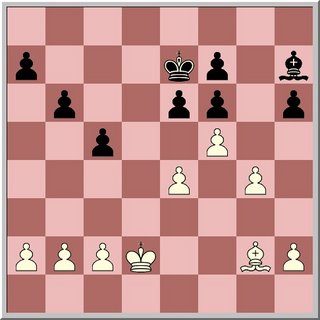So, the day finally has come--tomorrow the tournament commences. Six years have passed by without participating in any single individual over-the-board chess event for Elo-rating...
I must admit that my opening preparation has been far from decent. My memory lets me down far too often and I don't really know when I will be able to memorize even forcing lines.. :-(
For me, opening preparation is nevertheless important in that I need to have a feeling of confidence about the types of positions. Before tournaments, I usually study several games played in this or that opening, while I am still not so experienced to know where I need to stop and say, this (or that) is a starting point for which games to be collected (and studied).
I need help in making good use of Chessbase. (I have version 9.) Unfortunately, there is nobody around to explain how a professional (or half-professional :)) creates their repertoire using this application. (So, for the time being, I only have a single database with 2 games--one for White and the other for Black (as myself)--, and there I write all the lines I play along with the games I randomly choose from larger databases. Too bad, this way both games (with dozens of variations) become harder and harder to look through, especially because _all the opening lines with the particular color are mixed up_ in them. Is there more appropriate way of creating a repertoire?
BTW, what does "add to repertoire" mean? (In CB9.)
OK, that's for now, it's too late already, 4:29 AM actually, so I gotta go to bed. I am going to take the train in the evening, for I don't like waking up early in the morning. (Actually, in the mornings at all. :))
Finally, a little bit of wisdom I don't want to fail to share with the world: :) In this tournament, there will inevitably be games that I lose because of some blunder. (During games, I recognize whether I am a better player or not than my opponent, but still I am capable of losing strategically/tactically won positions against even weaker players due to some kind of distraction, when I fail to finish off the opposition.) But this time I feel prepared for that. I am not going to be too happy with a winning position and vice versa, I am not going to be too sad when I lose it.
Thus far, I have won five games in a row (all of the games already played in the team championship), but I do know that I am still able to find the losing move even in a won position. (Yes, I am!)
The goal of this emotional preparation is to
reduce expectations.
The less expectations you have, the less emotions get involved in the games. With less emotions you will have more energy to concentrate on playing--not the opponent but the board. And when it doesn't happen to work, nothing's going to happen, the end of the world hasn't come yet. Next time it will be better, nobody cares what the opponent thinks of your knowledge of chess.
Please click on
**THIS** link if instructed above

